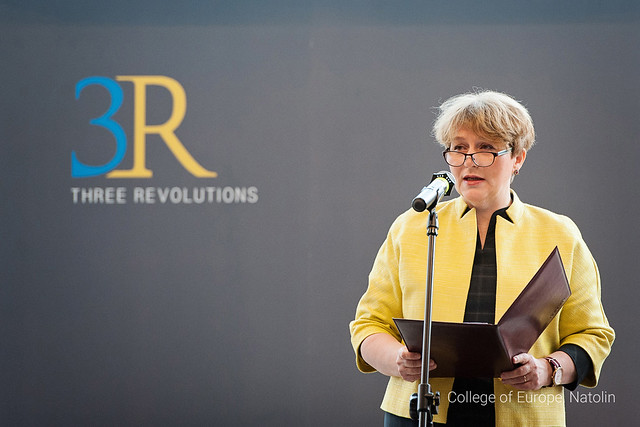From 28 February to 1 March 2017, the European Civilization Chair and the Natolin campus of the College of Europe organized the International Symposium "Three Revolutions – Portraits of Ukraine".
The Symposium was an unprecedented political, diplomatic and academic event as well as the final stage of the Three Revolutions (3R) interdisciplinary history project initiated and carried out by the European Civilization Chair in cooperation with a number of prestigious academic partners*. The world's most renowned experts on Ukraine, together with key political actors who shaped Ukrainian history, met for two days at the Natolin campus of the College of Europe for the most ambitious symposium ever organized on Ukraine’s three contemporary revolutions. The detailed programme is available here.
The Cox-Kwasniewski mission, the process of negotiating the Association Agreement with the EU, the "diplomatic backstage" and the political and social situation in Ukraine between 2011-2014 – these and many other crucial issues were discussed by those who experienced the Three Ukrainian Revolutions and shaped Ukrainian history. The symposium broke new ground and explored as yet unanswered questions like: How did former presidents negotiate the end of the Orange Revolution in 2004-2005? Are the concepts of revolution outdated? What were the motivations of revolution participants? What were the possible alternative scenarios?
Among the key political actors, who themselves shaped the events under discussion and who shared their experiences during the symposium, we were delighted to welcome:
Mr Viktor YUSHCHENKO, Former President of Ukraine; Mr Aleksander KWAŚNIEWSKI, Former President of Poland; Mr Pat COX, Former President of the European Parliament; Mr Vyacheslav KYRYLENKO, Deputy Prime Minister of Ukraine; Mr Hryhoriy NEMYRIA, Former Vice-Prime Minister of Ukraine for European and International Integration; Mr Borys TARASYUK, Former Minister of Foreign Affairs of Ukraine; Mr Marcus MECKEL, Former Minister of Foreign Affairs of the GDR; Mr Taras CHORNOVIL, Former Deputy in the Verkhovna Rada; Mr Andrii SADOVYI, Mayor of Lviv; Ms Rebecca HARMS, Member of the European Parliament.
A strong body of outstanding scholars were represented by Prof. Yaroslav HRYTSAK, Prof. Andrzej NOWAK and Mr Mykola RIABCHUK inter alia. The full list of participants can be found in the programme. Faculty members of the College of Europe Natolin campus, the 3R project team and the media partner New Eastern Europe were also represented.
Visit www.3rnatolin.eu to learn more.
*Academic Partners: Kyiv-Mohyla Academy; Harvard Ukrainian Research Institute; the Institute of Political Studies of the Polish Academy of Sciences; the Eastern European Studies program of the University of Warsaw; University College London's School of Slavonic and East European Studies; the University of Alberta's Canadian Institute of Ukrainian Studies; and the Centre d'études des mondes russe, caucasien et centre-européen (Cercec), Paris.
Media Partners:


